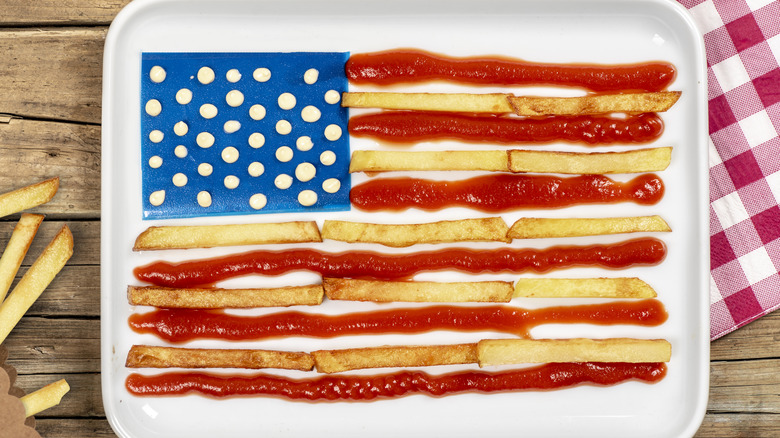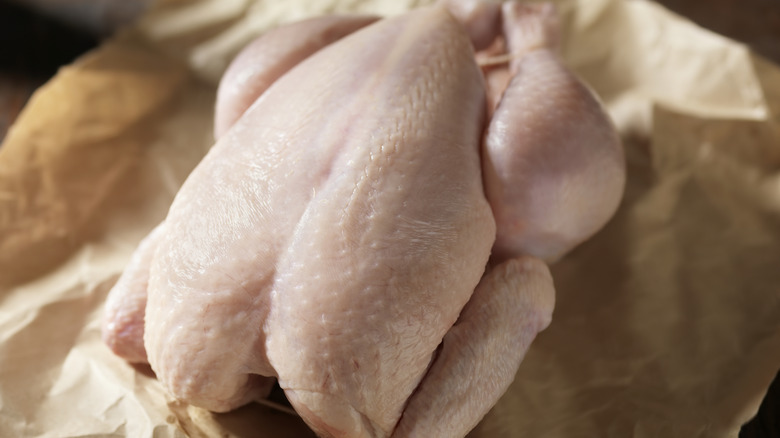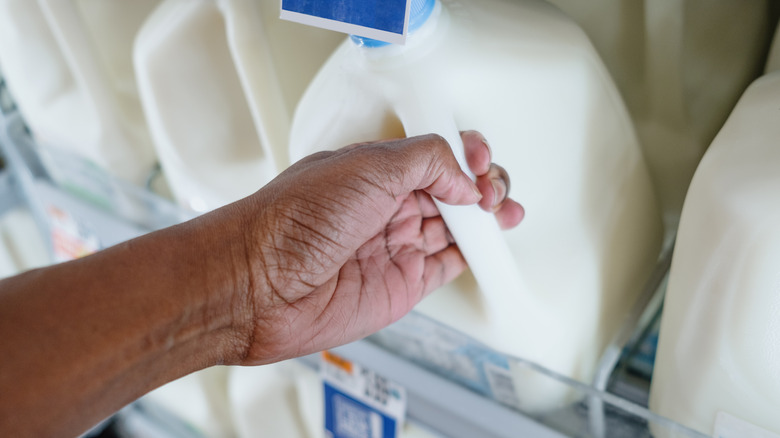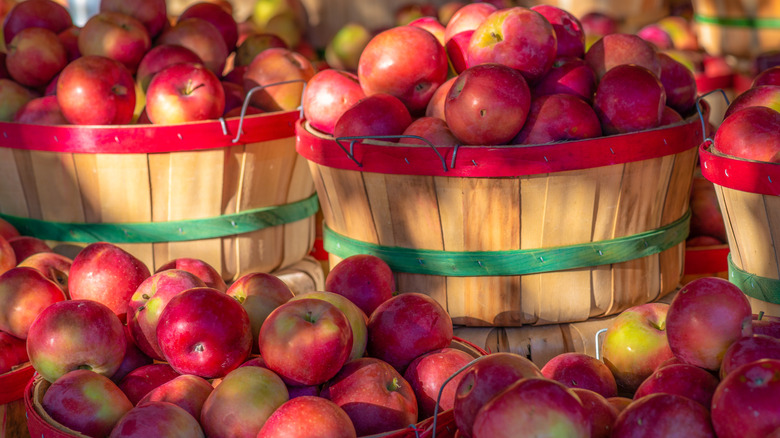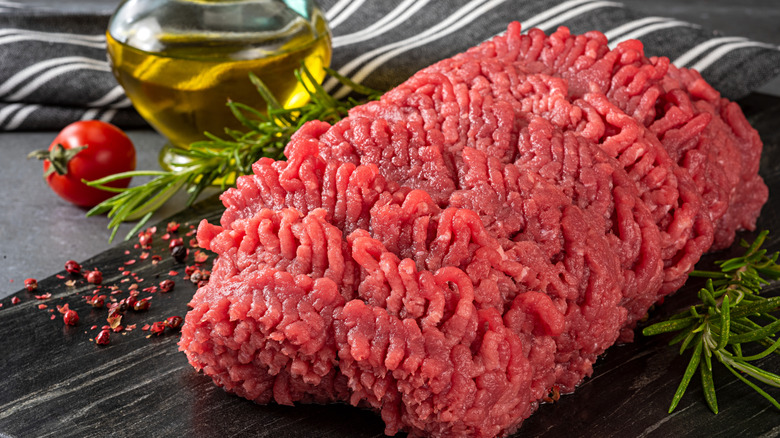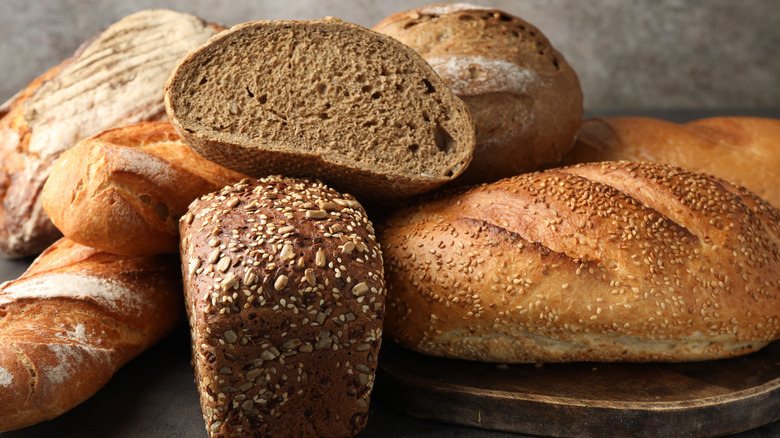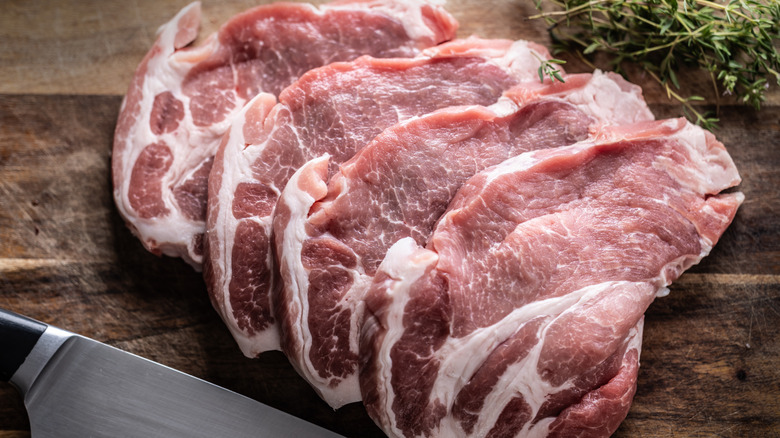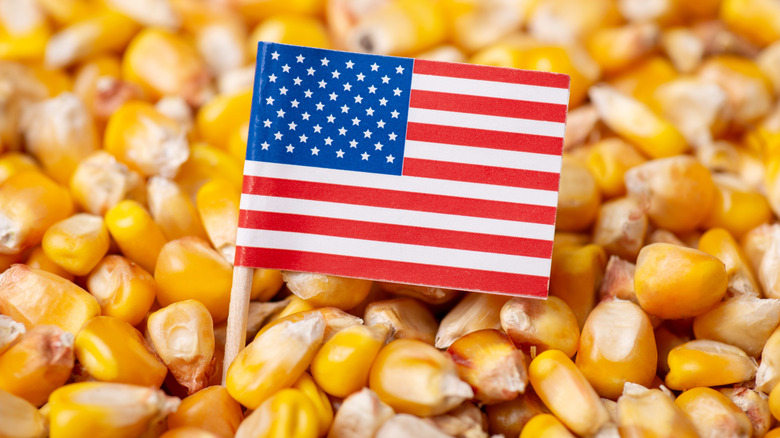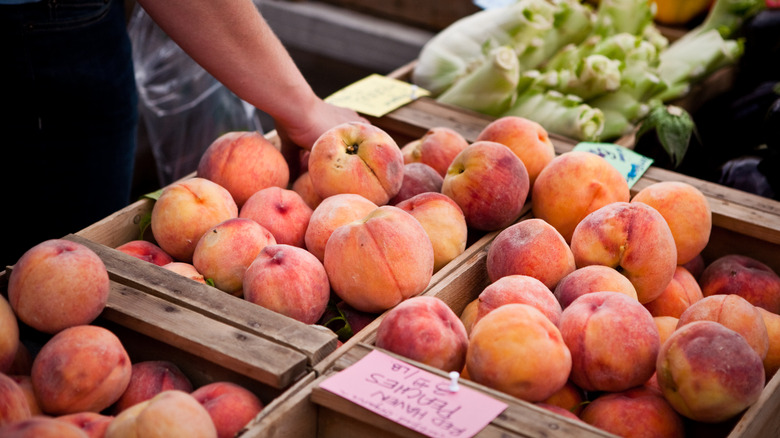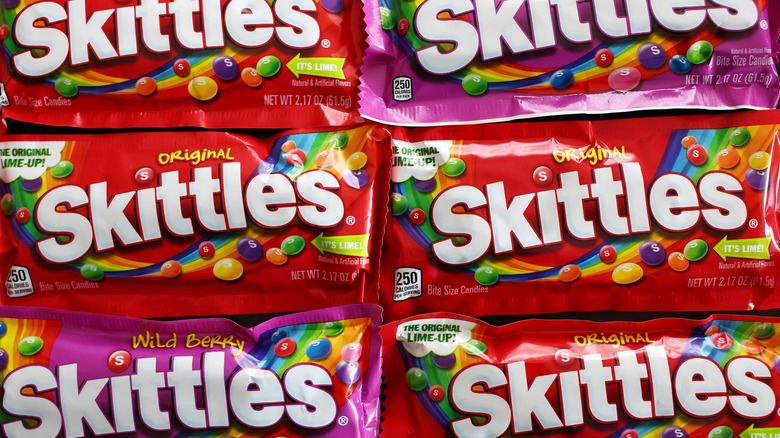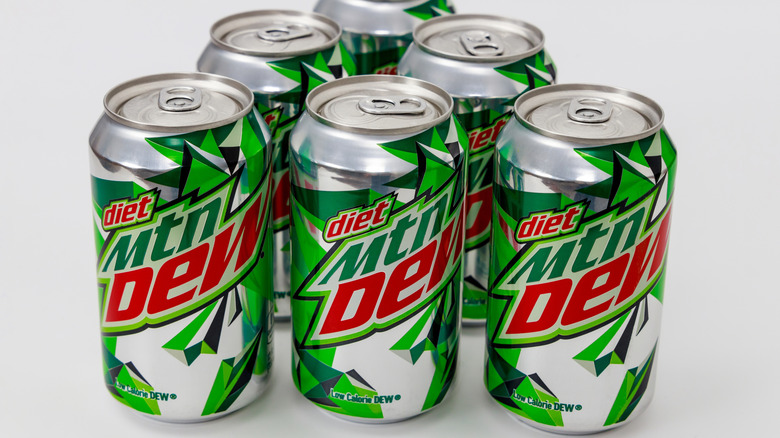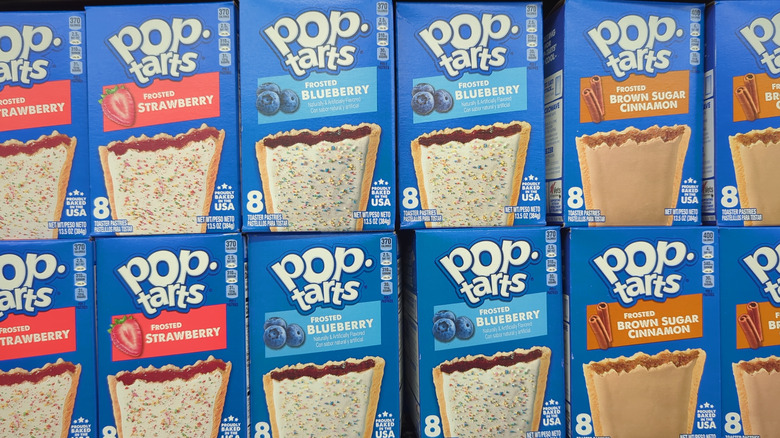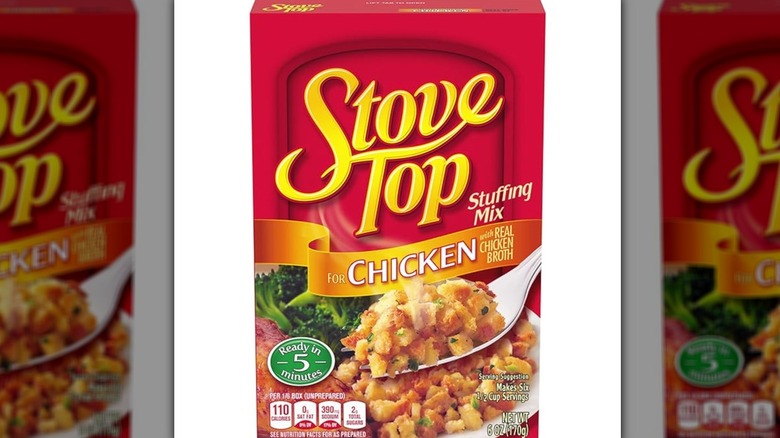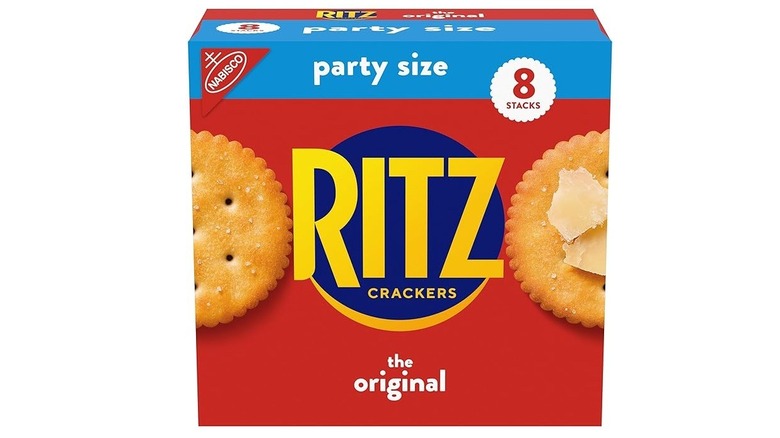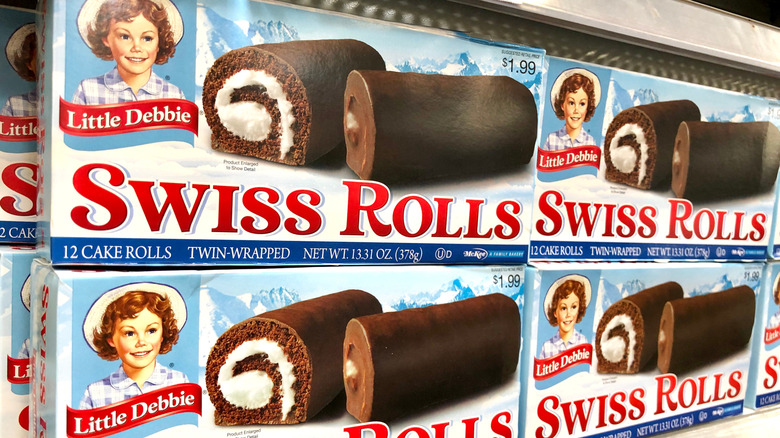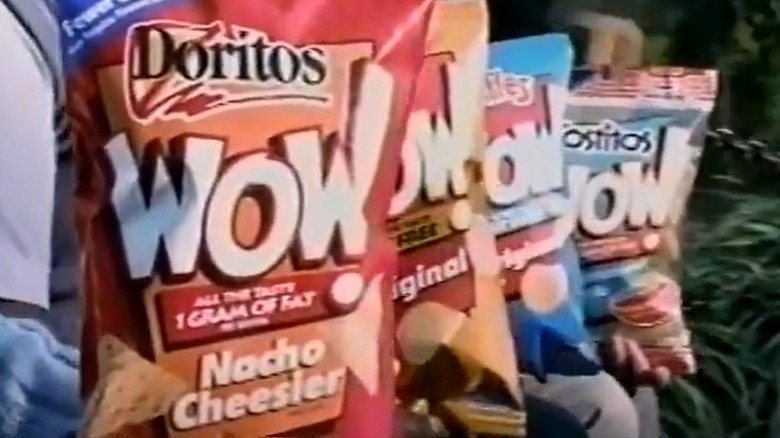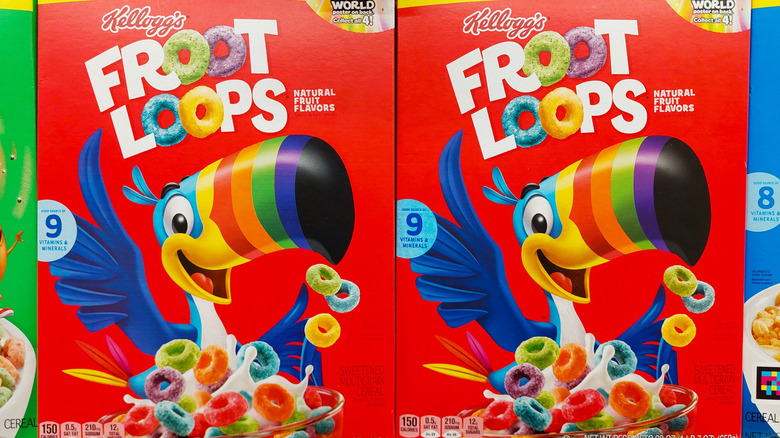16 Popular US Foods That Are Banned In Other Parts Of The World
We may receive a commission on purchases made from links.
American culture has been exported around the world, and with it, iconic foods such as hamburgers, hot dogs, and deep-fried chicken. Consumers in the United States have a mind-bogglingly wide range of products to choose from — some of which contain ingredients that are not all that good for us.
They are also the reason why a surprising number of items, grown or manufactured in the U.S., can't be shipped abroad. The internet is full of stories about home-grown foods that you can't eat in countries including Australia, Japan, the United Kingdom, and the European Union, stopping some of our favorite items from following in the hamburger's footsteps.
So, what gives? Why can't Australians cut into a loaf of U.S. bread, and what's Poland's problem with the breakfast staple Pop-Tarts? Strap in as we find out why 16 popular U.S. foods are banned in other parts of the world.
U.S. chicken
In 2023, the National Chicken Council named broiler chicken the United States' most-eaten meat, with most of those birds coming from factory farms. Sadly, their cramped, often unsanitary living conditions are a long way from the idyllic image of farmyard birds pecking at dirt. It's also why U.S. chickens are washed in chlorine, as it is a good way of eliminating dangerous bacteria such as salmonella.
Chlorinated chicken cannot be sold in the European Union and United Kingdom but not because of the bleaching process. The 1997 ban — which the U.K. maintained after Brexit — is aimed at the poor animal welfare standards which require chickens to be chlorinated in the first place. In 2008, following intense lobbying by the U.S., the World Trade Organisation tried to persuade E.U. countries to change their minds about the process, but they refused.
U.S. milk
Milk is big business in the United States, with output from dairy farms hitting over 26 billion gallons in 2023. Keeping up with that growing demand prompted farmers to use science for help. A synthetic version of a naturally occurring hormone bovine somatotropin (BST), known as recombinant bovine somatotropin (rBST), was developed and has been used in the U.S. since 1993 to increase production in dairy herds. However, it has also prevented American milk from being exported to several countries.
While there is no evidence to show BST or rBST is harmful to humans, studies found it did increase the risk of mastitis and lameness in cows. Because of this risk to animal welfare, the sale and use of BST were banned in the E.U., the U.K., and Australia. In Canada, where rBST is also prohibited, dairy products made using U.S. milk are sold, but not always labeled as such, so consumers are urged to buy Canadian.
U.S. apples
Industrial farmers around the world rely on pesticides to grow crops and, for apple growers, a harvest that doesn't turn brown while in storage. In 2008, European Union safety regulators started asking pointed questions about the pesticide diphenylamine (DPA) — which prevents spoiling — which can sometimes break down into cancer-causing chemicals called nitrosamines.
Despite limited evidence this reaction could happen when DPA is mixed with nitrogen, the European Food Safety Authority issued a blanket ban on treating apples with DPA in 2012. Two years later, EFSA officials cut the maximum permitted level of the chemical to 0.1 parts per million. In a 2010 study, tests of raw apples from the U.S. revealed that 80% were coated in DPA at an average concentration of 0.42 ppm. In 2014, the EPA Office of Pesticides confirmed there were no plans to change domestic limits from 10 ppm.
U.S. ground beef
In 2012, all hell broke loose after ABC reported on "pink slime" being used as a filler in ground beef products. It was made from mixed-up bits of fat, meat, and connective tissue that were flushed with ammonia gas to preserve them before being turned into a paste. The previous year, British chef Jamie Oliver had campaigned against the use of ammonium hydroxide in fast food, prompting McDonald's in the United States to stop using pink slime.
Although consumers in the U.S. were surprised at what was being put into the ground beef they cooked at home, people in the E.U. were less so, because products made using mechanically separated meat, including pink slime, had long been banned since 2010. In 2012, Canada announced it was not permitting the use of ammonia in ground beef or meats during production. In 2017, five years after its report, ABC settled a defamation claim with a South Dakota meat producer for more than $177 million.
U.S. bread
There are two reasons why people in the E.U., Canada, or India have never sunk their teeth into one of the many types of U.S. bread: Potassium bromate and azodicarbonamide. The first is a flour additive used by breadmakers for fermentation and ripening. The E.U. is among several countries that have banned it due to the possibility it could cause cancer in humans. Potassium bromate is also prohibited in India and China, as well as several other countries, and restricted to industrial use in Canada.
The second chemical, azodicarbonamide, is used to leaven and whiten bread dough and is recognized as safe by the FDA but deemed by other nations as posing a cancer risk. It has been banned as a food additive in the E.U. for many years, as well as in Australia. Potassium bromate and azodicarbonamide are among three ingredients the Center for Science in the Public Interest told the New York Post it hopes will be scrutinized more closely by FDA officials in the future.
U.S. pork
A plate of baby back ribs with a side order of ractopamine doesn't sound very appetizing, but that's what's served up by some industrial producers in the United States — perfectly legally, as it's approved by the FDA. Ractopamine is added to pigs' animal feed to boost growth but it has been banned in the E.U. since 1996, followed by China in 2011, dealing a blow to potential U.S. suppliers as both markets are major consumers of pork.
In 2012, the Taipei Times reported that, according to Professor Donald Broom of the University of Cambridge's Department of Veterinary Medicine, animals treated with ractopamine were more active and more difficult to handle. In 2024, the Food Animals Concerns Trust joined a lawsuit that urged the FDA to withdraw its approval of ractopamine or reduce the permitted residue levels in pigs.
U.S. corn
The United States is the world's largest producer, consumer, and exporter of corn, the majority of which is a genetically modified organism or GMO. While this science has helped make crops increasingly resistant to damage from bugs and disease, not everyone is convinced of its benefits. In the European Union, only foods or products containing authorized GMOs can be imported. Until 2024, only five maize crops were allowed before three more were authorized for 10 years by the European Commission.
While that's potentially good news for U.S. corn growers and European consumers who can try cooking their delicious cobs in butter, trouble may be brewing much closer to home. In 2025, The Mexican government changed the country's Constitution to ban the planting of GMO crops and enshrine the country's native, heirloom corn species as "an element of national identity." The move could impact U.S. shipments of corn to Mexico, which accounts for 36% of its total exports.
U.S. peaches
Sixteenth-century Spanish colonizers may have brought the peach to the United States, but since 2018, Spain and the rest of the European Union have decided they didn't want any U.S. imports of the fruit, thanks to the ban on neonicotinoids. This group of pesticides is widely used in the U.S. on a variety of crops, but their effect on pollinators, especially bees, has been catastrophic.
A 2019 study found that many popular fruits and vegetables in the U.S. contained "low levels of neonicotinoids," while tests carried out by EWG in 2024 found traces of 59 different pesticides in peaches, while a single fruit could contain up to 19 different types of neonicotinoids. In 2024, a two-year ban on a similar pesticide, chlorpyrifos, was overturned in the U.S. following a legal battle between environmental groups and the EPA. That means numerous vegetables and fruits — including peaches — would again be sprayed with the harmful chemical.
Skittles
Launched in 1971, Skittles has been delighting sweet-toothed kids and adults for decades. That was, until the European Commission banned the food additive titanium dioxide, also known as E171, in 2022. It followed an assessment by the European Food Safety Authority which could not rule out the risk that the additive could have a carcinogenic effect on humans.
E171 isn't the only ingredient that has given the E.U. pause over Skittles. The synthetic food dyes Yellow 5 and Yellow 6 are both used in the candies, which a 2021 California study said had an impact on the neurobehavior of some children. They are both banned in the U.K. but not in the E.U. Instead, products using these colorants are required to carry the following warning: "May have an adverse effect on activity and attention in children." alarmingly, the FDA's existing acceptable daily intake levels are based on data from around 50 years ago.
Mountain Dew
An impressive 40% of people in the United States who enjoy soft drinks opt for Mountain Dew. But, if they go looking for their soda of choice elsewhere in the world, they are unlikely to find it in the European Union, the United Kingdom, Japan, and India. From August 2025, Mountain Dew will be increasingly hard to find in Canada, too. The reason? Bans on brominated vegetable oil or BVO.
It's a stabilizer, made with a blend of vegetable oil and bromine, that allows citrus-flavored drinks to taste the same all the way down the bottle or can. Animal studies have found that brominated vegetable oil can lead to issues with the heart, thyroid, and liver, as well as potential bromism, which has symptoms including memory loss and ataxia.
Although the FDA removed BVO from its list of products that are generally believed to be safe decades ago and placed restrictions on the amount that could be used, a lack of evidence of its harmful effects on humans prevented a full ban in the U.S. until 2024.
Pop-Tarts
What do cocktail cherries and Pop-Tarts have in common? It has nothing to do with the word toast: They both contain the color additive Red Dye No. 3, also known as E127 or erythrosine. While U.S. exports of the candied fruit containing E127 are permitted in the European Union and United Kingdom, the popular breakfast snack is not on the list of either country, so it ain't getting in. The synthetic color is the reason why.
A petroleum-based product, Red Dye No. 3 is present in a wide range of products, including Pop-Tarts. Although animal studies linked it to cancer and the FDA banned its use in cosmetics in 1990, it took until 2025 for the administration to completely ban Red Dye No. 3 in foods. U.S. manufacturers and candy brands will have until January 15, 2027, to find alternative red colorants for their products.
Stove Top Stuffing
Who has enjoyed a Thanksgiving meal with a side of moist, moreish Stove Top Stuffing from Kraft Heinz? Families across the United States love it for its speed and convenience, but despite that popularity, even an upgraded version of the boxed stuffing is unlikely to appear on shelves in the European Union, Japan, or the United Kingdom. It's all down to restrictions on the use of preservatives butylated hydroxytoluene (BHT) and butylated hydroxyanisole (BHA) which both feature on the box's ingredient list.
In the E.U., BHA, also known as E 320, is permitted in chewing gum, specific fats and oils, and vending machine milk powder, while BHT or E321 is allowed in chewable supplements and some emulsifiers. In the U.K., BHT's use is restricted to oral care products such as toothpaste and mouthwash, while in Japan, both preservatives can only be used in products including butter, fish and shellfish, mashed potatoes, and whale meat.
Ritz Crackers
Unlike some savory snacks, this iconic product has a dedicated following in the United States, but that didn't prevent Ritz Crackers from being banned across Europe because of trans fats. Artificial trans fatty acids can increase the risk of developing diabetes, heart disease or having a stroke. In 2003, Denmark pioneered the restriction of industrially produced trans fat to 2% per 100 grams of fats and oils across all foods.
The European Union followed suit, as well as the United Kingdom, Norway, Switzerland, and Liechtenstein, while Iceland has all but banned trans fats. Although Ritz Original Crackers appear to now fall within the trans fat limit, it's too early for devotees outside the United States to start celebrating. According to the ingredients list, the snacks also contain palm oil, which has been banned in the E.U. since 2023.
Little Debbie Swiss Rolls
Little Debbie is a household name in the United States, but this popular brand of sweet treats is virtually unknown abroad. The company's ever-changing range includes packs of 12 chocolate-covered mini Swiss Rolls, which have been a family favorite since 1963. Unfortunately, they also fall foul of red tape, both in the European Union and United Kingdom.
Little Debbie Swiss Rolls contain the synthetic food dye Yellow 5, which is prohibited in the U.K. However, in the E.U., because of its impact on kids who may be sensitive to artificial ingredients, any product sold in the bloc that contains the colorant must be labeled: "May have an adverse effect on activity and attention in children." Little Debbie doesn't have to bother, as its Swiss Rolls also contain palm oil, which has been banned in the E.U. since 2023 as part of the bloc's efforts to limit deforestation.
WOW chips
Whether you keep 'em cool in the fridge or stash them in a cupboard, we all know that too many potato chips can be bad for us. So, when Procter & Gamble researchers stumbled across a fat alternative that was not absorbed by the body, they ran with it and used it in the WOW range of chips that included Doritos, Ruffles, and Lay's. Marketed as a healthier snack option, unfortunately, some consumers experienced unpleasant side effects, including abdominal cramps and diarrhea. Although the FDA backed Olestra, it has never been approved in Canada.
In 1996, an article in Canada's Maclean's magazine sounded the alarm from scientists, while two years later, researchers said Olestra was safe and anticipated its approval in the country. They are still waiting. In the European Union and the United Kingdom, the situation is less clear. Olestra could come under the E.U. trans fat restriction, and it doesn't appear on the U.K.'s list of approved additives, but there are no details of an outright ban.
Blue Froot Loops
They may not be all that in the flavor department, but Kellogg's Froot Loops are a breakfast staple in millions of households across the United States. Sadly, they haven't always been so popular overseas. The ingredients are a laundry list of restricted items in the European Union, including the preservative butylated hydroxytoluene (BHT), which can be used in certain food items, and breakfast cereal is not among them. Likewise, in the United Kingdom, BHT can only be used in oral hygiene products. And that's not all.
Froot Loops' iconic colors are the result of synthetic dyes, including Blue 1 — also known as brilliant blue FCF — which many sources claim is banned in the European Union and other countries. Happily, the colorant was re-evaluated in 2010 and is no longer prohibited. The New South Wales government in Australia also allows the use of brilliant blue FCF, albeit to a maximum limit of 290 milligrams per kilogram in processed foods. However, in 2027, California will become the first U.S. state to ban several dyes, including those used in Froot Loops, from being served in schools.
